Sport
Call it off: This is one opponent we can’t afford to run into
And that was from standing around having canapes and toasting the happy couple, not from one infected player quite innocently getting down and dirty with 29 others before mingling with others socially.

It is against the backdrop of those events that I ask the NRL and the AFL again: WHAT THE HELL ARE YOU DOING???? How, in good conscience, can you proceed to play when you not only endanger the players but everyone in their families, everyone they are associated with?
Every other professional sports league in the world, and most amateur ones, have shut down immediately because it is the right thing to do, but Australia is somehow different? Our blokes won’t get it because you’re telling them to go straight home from the game? And who do they see there? No one? Or do they see their wives and their children? And who have they seen that day?
I get that this is a business, and enormous amounts of money are at stake. But, too bad. The Governor of New York, where cases doubled from 1000 on Tuesday to 2000 on Thursday and have even been reported in their prison system, put it well: “The crisis at hand is a public health crisis. Once we get past that, we’ll deal with the economic crisis.”
I get that people are talking about the costs of shutting things down. Can we focus on the costs of not shutting things down? There is a chance, just a chance, that Australia can flatten our infection curve enough so that we won’t overwhelm the hospital system. Professional sports like the NRL and AFL, which have been so exemplary on so many fronts of community action in recent years, need to do their part. That includes not getting infected yourselves, but also setting the right example. Our best chance of flattening the curve is establishing a non-contact world. Your actions are entirely inimical to that. Call off the jam, you bastards!
Wildcat strike
Well I never. Two things seemed obvious to me regarding the cancelling of the NBL grand final series between the Kings and the Wildcats. First, that it was the right thing to stop the series dead. And second, that as the Wildcats were ahead 2-1 when the series was called off, it was right to call them the winners, no questions asked, and congrats to them.
Not everyone, however, saw it like that, least of all theowner of the Kings, Paul Smith, who told Andrew Webster of his dealings with NBL owner Larry Kesselman: “We had an explicit three-way conversation last Friday … It was explicitly stated by the Wildcats and the Kings that neither was to have the championship without completing the five-game series. Explicit.”
This is a very strong charge. I approached Kesselman. He is the bloke who put a good chunk of his fortune behind resuscitating the NBL when it was about to collapse five years ago and is a fellow I know personally to be a very quietly spoken, understated businessman.
His answer was without rancour but immediate and firm.
“My word is my bond and there was categorically no such agreement reached between us and the teams. I am proud of our sport and my team, how we have conducted ourselves and the process we ran to achieve what we feel was the right outcome in an unprecedented environment for all involved. We feel blessed on the timing of our season and feel for other sports and the greater community. Thank you.”
Done. Game over. Broadly, basketball’s timing could have been better, but only by a few days. In the post-coronavirus world, the NBL is one comp I would name now as the most likely to quickly get back on its feet.
Listen to Cam
In the meantime? In the meantime perhaps the denizens of rugby league could give their most iconic figure, Cameron Smith, a break. After the game last week, Smith idly opined that there might be more important things than rugby league, and now might not be the time to be playing it, which saw him bitterly criticised publicly and privately.
Friends? Smith saying this was no more than of Nero’s generals saying: “You know what? Given that Rome is burning and all, now might not be the right time to have our annual fiddling competition, seeing as, you know, fiddling throws sparks and there are more important things to be doing right now!”
Smith is right. His critics are wrong. Deal with it.
Under-arm hero
TFF is doing a book on the Boer War and Breaker Morant at the moment and came across the story of an Englishman, Captain Arthur Turner, who covered himself in glory in the battle of Nitral’s Nek by continuing to load and fire a gun himself alone despite the fact that all his men were wounded or killed, and despite being wounded three times himself. When I asked one of my researchers to find out more about him – so the reader could give a stuff about his heroics – he came back with the answer that not only was he a “well-known Essex batsman” but, and here’s the killer, he was “one of England’s last remaining underarm bowlers”.
WHAT?
Yes’m, though you and I didn’t know, right up until the late 1800s there were still bowlers doing it under-arm until the new-fangled over-arm bowling took over because it was demonstrably faster and more accurate.
Just who Australia’s last under-arm bowler was – yes, yes, yes but please avoid the bleeding obvious and that is not fair to him in any case – I don’t know, but I’ll ask my favourite Oz sports historian Geoff Armstrong to get on to us and report back before next week. Stand by sports fans, I think we can expect a LOT of sports nostalgia, sports history etc, in weeks to come.
What They Said
Dave Hughes on the AFL comp being launched regardless: “Shelve it please AFL. It’s OK to admit you were wrong. It’s a really bad idea on so many levels. All organised sport, at all levels, all around the world, has been cancelled because of health advice but somehow AFL, NRL and A-League are different. Why?”
ARLC chairman Peter V’landys in a press conference on Sunday morning as the full import of the coronavirus really started to hit home. “An Australia without rugby league is not Australia! The government has to assist us in this crisis because it is not of our own doing. Rugby League … is people’s escape, it is people’s relaxation. And we have to do everything we can to continue the tradition of rugby league.”

V’landys again: “The last resort for us is to go to the players and ask them for a pay cut because, like the rest of us, they’ve got mortgages and made commitments on the money they believe they’re going to get.”
V’landys again: “We are doing everything we can to minimise risk.” No you are not, Peter. Not playing is minimising risk. Playing is maximising risk.
Cameron Smith: “This thing is bigger than rugby league. I know there are a lot of decisions to be made around our sport from the administration but this affects more than just rugby league and rugby league players.”
GWS Giant Toby Greene on his experiences during the grand final parade after being called a “dog” and “c–t” for several kilometres: “I would have been happier for them to drive the car a bit quicker, there were people three metres away just abusing me. After two kilometres, I thought ‘this is quite shit’. But it’s all part of football, it’s tribalism, I knew it was coming.”
Jurgen Klopp, the manager of Liverpool, urges football fans to follow expert advice: “If it’s a choice between football & the good of the wider society, it’s no contest.”
Andrew Bogut after the Wildcats were declared NBL champions: “A quick note to say I could not be any PROUDER of the Sydney Kings and our playing group. After almost 3 hours of back and forth (and plenty of tears) we came to what ultimately was the hardest decision any Athlete or Team could make.” It was, nevertheless, the right decision. Call off the jam. More important things.
Wildcats captain Damian Martin on his team being awarded the title: “At the end of the day Sydney made their decision, and they’re the ones that decided they’re not going to play. So I think that’s enough to say, ‘OK, the other team wins’.” So long as there was no actual agreement to hold on declaring a winner, I agree with that, too.
AOC vice-president Ian Chesterman on the Tokyo Olympics: “For many this will be their only opportunity to be at an Olympic Games. If everybody is planning for the Games, we must plan for the Games as well, because that’s our obligation to the athletes. We know the athletes also want to be there. We need to be able to deliver them safely and get them home safe safely.”
Nick Green, former Australian Olympic chef de mission and Oarsome Foursome member: “A couple of weeks ago, I was as confident as everyone else, saying the Olympics would go ahead, no problem. I’m pretty robust about it but I don’t have the same robustness in my thinking now. I actually can’t see how the Games can go ahead, to be frank.”
Hayley Wickenheiser, Canadian four-time Olympic hockey gold medallist and IOC member: “I think the IOC insisting this will move ahead, with such conviction, is insensitive and irresponsible given the state of humanity.”
Deputy PM of Japan Taro Aso: “It’s a problem that’s happened every 40 years — it’s the cursed Olympics – and that’s a fact.” He was referring to the 1940 Summer and Winter Games – both scheduled for Japan, before WWII cancelled them, and the heavily boycotted 1980 Moscow Olympics. But, amazing, yes, that the IOC had scheduled two successive Games to such heavyweight militaristic regimes as Nazi Germany in 1936, and the Japanese in 1940.
Dale Steyn: “In South Africa we kind of like looking for things that unite people in big, big groups. When you don’t have sport, it’s like, oh, what do we fall back onto? And I think Nelson Mandela was the first person to really say that: sport unites people in a way that nothing else does. And if you take sport away, then I don’t know really what we have. We’re gonna have to work it all out.”
TEAM OF THE WEEK

Tom Brady The most famous quarterback in the world, now in his early 40s, is leaving the New England Patriots and moving to the Tampa Bay Buccaneers. The obvious question being will this all be over by the beginning of the next NFL season?
Perth Wildcats Won another NBL title, although this one will be remembered for different reasons.
NSW Crowned Sheffield Shield champions after leading with one round to play when stumps were called on the comp due to the coronavirus.
RIP Dr John Solomon The long-time Sydney University rugby icon and former Wallaby captain passed away this week. He was, most famously, one of the 1949 Wallabies who beat the All Blacks on New Zealand soil in successive Tests. Dem was da daze!
Peter FitzSimons is a journalist and columnist with The Sydney Morning Herald.
Sport
Manhattan driver who killed pedestrian had been drinking all day: prosecutors
[ad_1]
A driver who killed a 23-year-old pedestrian and injured four others in a blistering Gramercy Park crash drank all day before getting behind the wheel with a blood alcohol level nearly twice the legal limit, prosecutors said Tuesday.
Mahbub Ali was ordered held on $300,000 bail for the wild Sunday evening crash that sent pedestrians scrambling for cover and left victims scattered along the roadway.
Ali, 26, admitted he started drinking at brunch around noon Sunday — and never stopped, Assistant District Attorney Taylor Maurer said during Ali’s arraignment in Manhattan Criminal Court.
:quality(70)/cloudfront-us-east-1.images.arcpublishing.com/tronc/MBMRQPTJ5RBX3EQHUU6AM7V3Q4.JPG)
After brunch, the Queens resident went to another location and kept on drinking, the prosecutor said.
Two hours after the 7:30 p.m. crash on Third Ave. near E. 21st St., Ali’s blood alcohol level was still .158.
“(He) admitted to going out drinking all day and to driving after,” Maurer said. “Because of (his) decision to drink and drive, there are now four individuals who suffered physical injury, two of whom needed surgery, and one 23-year-old man who is dead.”
:quality(70)/cloudfront-us-east-1.images.arcpublishing.com/tronc/7V3EJVCPW5ABXMDAYVUSA443PI.JPG)
Abdulhekim Esiyok, 23, was crossing Third Ave. near E. 21st St. when Ali slammed into him.
“I held his hand and he was gone,” said freelance journalist George Colli, who heard the crash and raced to the scene, finding the victim curled in a fetal position next to a crumpled metal trash can. “Me and another woman prayed over him. It gave me some kind of comfort.”
Colli recognized Esiyok from a local church group where he’s a volunteer. The Turkish immigrant was staying at a shelter near where he was struck, Colli said.
:quality(70)/cloudfront-us-east-1.images.arcpublishing.com/tronc/P3LBXE5PPBBEFLAWZIUXRSV6DA.JPG)
“He was a very hard worker,” said Colli. “He came here to work and send money to his family back home.”
Four others were hurt in the crash. Debris including broken bits of a bicycle was found scattered over half a block.
Zipping uptown on Third Ave., Ali’s Hyundai Sonata struck Esiyok in the marked crosswalk at E. 21st St., then swerved right and hit an 18-year-old man turning onto the avenue on his e-bike, police said.
Ali then mounted the sidewalk, his car’s right tires hitting two more pedestrians, a 21-year-old man and a 26-year-old woman, before slamming into a parked unoccupied NYPD van.
“I was just crossing the street when I heard a bang,” a nearby resident who identified himself as Robert told the Daily News Monday. “There was a scary sound, a lot of commotion, a lot of screaming. You knew right away something was wrong.”
:quality(70)/cloudfront-us-east-1.images.arcpublishing.com/tronc/ZHOQQVGVCBFMDEKTBWZA3HT2IQ.JPG)
The Daily News Flash
Weekdays
Catch up on the day’s top five stories every weekday afternoon.
“You saw people on the ground triage kind of instantly and pieces of car mixed with bike strewn all over the ground,” he added.
Ali was caught on surveillance camera striking the NYPD vehicle, a garbage can and a light pole, according to court papers. A 25-year-old woman in the passenger seat of Ali’s car suffered a leg injury.
Esiyok was “thrown in the air for a significant distance” when Ali rammed into him, Maurer said.
Medics rushed all the victims to Bellevue Medical Center, where Esiyok died.
More than $6,000 has been raised on a GoFundMe post for Esiyok’s family.
Ali was standing outside his mangled car when he was taken into custody, cops said. It was his first arrest.
A call to Ali’s attorney was not immediately returned Tuesday.
[ad_2]
Source link
Sport
NBA tells teams to close training facilities by Friday

With coronavirus cases mounting inside the NBA’s 30 organizations, the league informed teams to close their practice facilities to players and staff by Friday. The decision was confirmed by a league official not authorized to speak publicly
The proclamation, which came via memo Thursday morning, occurred before three teams announced or had reported positive coronavirus tests inside their buildings.
Three members of the Philadelphia 76ers organization and one from the Denver Nuggets tested positive for the virus, the teams announced early Thursday. Late Thursday afternoon, the Lakers announced two players were infected with the coronavirus.
Shortly after that, the Boston Celtics announced one of their players had tested positive for virus. The player is asymptomatic and has been in isolation for several days. The Celtics said testing was initiated because of exposure to a known positive patient.
Celtics guard Marcus Smart later posted on Twitter that he had tested positive.
“I’m OK and I feel fine. I don’t feel any of the symptoms,” Smart said in a video. “But I can’t stress enough practice social distancing and really keeping yourself away from a large group of people — washing your hands and help protect yourself and help protect others by protecting yourself.”
Smart brings to 10 the number of NBA players infected. Utah’s Rudy Gobert and Donovan Mitchell, Detroit’s Christian Wood and Brooklyn’s Kevin Durant, along with three of his Nets teammates, have also tested positive.
Neither Denver nor Philadelphia said if their positive tests were for players.
The 76ers said in a statement that they had “in consultation with medical experts and the NBA, received the recommendation that certain individuals from the organization, including players, coaches and specific basketball operations support staff, be tested for COVID-19. The tests were secured and processed privately.”
The Nuggets said the member of their organization who tested positive for the coronavirus had been experiencing symptoms.
The NHL, which shares arenas with NBA teams in Philadelphia, Boston, Denver and Los Angeles, said they still only have one positive case of the coronavirus — an unidentified player on the Ottawa Senators.
In a televised interview with ESPN’s Rachel Nichols on Wednesday, Commissioner Adam Silver said NBA players could be considered “super spreaders.”
“They are young people who are working in close proximity to each other,” Silver said. “They are traveling at great frequency. They are regularly in large groups, including the public, and for young, the young cohort in particular, large numbers of them are asymptomatic, and if they do have symptoms, they’re relatively mild.”
It’s why, in part, the NBA instructed teams to close their facilities.
Since the suspension of play on March 11, players have been allowed to work out in team practice facilities provided they do so individually with one other staff member, distanced from the rest of the players, coaches and staff.
But with positive tests mounting and social distancing normalizing, the NBA made the decision to close the doors to team facilities. Players are not allowed to work out in any non-NBA gyms, largely forcing them away from the game while the league and the country tries to slow the spread of the virus.
The rapid spread of the virus among NBA players was always a concern since the league first began wrestling with the pandemic. Without factoring in officials, who bounce between teams throughout the season, the NBA operates in a tight system.
You can connect all 30 teams to the Lakers with only four degrees of separation in the final week before the NBA called off games.
Within minutes of Gobert’s positive test being reported, the NBA suspended its season, helping trigger the same response of other pro and college sports leagues and conferences.
Asked Wednesday about the four Nets players who tested positive, Silver said he was expecting it.
“I honestly was not all that surprised,” he said. “I’d say that based on what we’re hearing and given the lack of testing that’s available, my sense is that, especially in the New York area, that if you took almost any random group of New Yorkers, that it’d be likely, increasingly likely, that there are gonna be some positive tests.”
Sport
Watching Sports in a Season of the Coronavirus
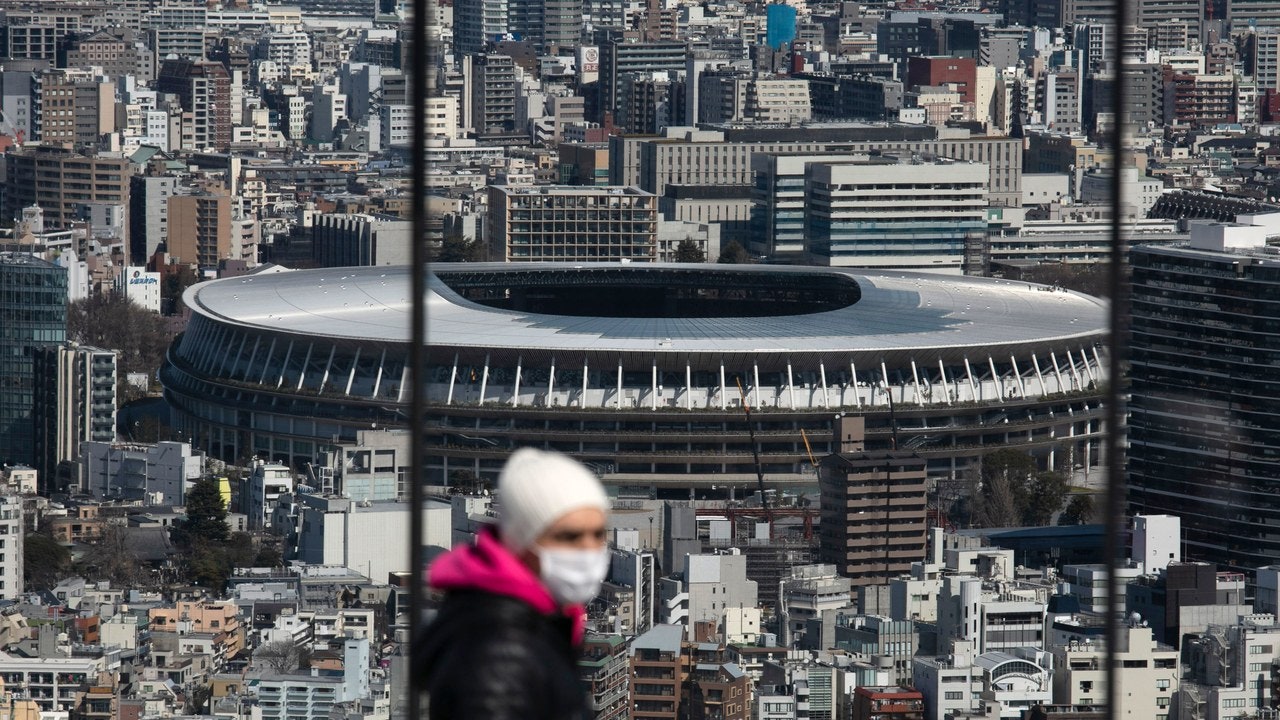
There is a handshake carved onto a three-thousand-year-old Assyrian throne, and there are handshakes etched onto Athenian gravestones from the fifth century B.C.E. Hands grasp hands on old Roman coins. “They shook hands and swore brothers,” Shakespeare writes in “As You Like It.” On Monday, at a press conference, as more confirmed cases of the coronavirus began to be reported around the country (and the world), the U.S. Surgeon General, Jerome Adams, said, “We should probably rethink the handshake for a while.” People have suggested tapping elbows, politely bowing, waving from afar, or “footshaking” (good luck with that). As long as people wash their hands and avoid touching their faces, it’s not clear how much of a problem handshakes will actually be—and, in any case, I usually prefer to keep my hands to myself. But it’s hard to imagine sports without handshakes—and high fives and sweaty hugs, not to mention sustained physical contact.
Already, some leagues and teams are altering standard rituals in response to the pandemic. The Atlantic 10 Conference basketball tournaments have banned pre- and post-game handshakes among players. The N.B.A. recently circulated a memo urging players to use fist-bumps instead of high-fives with fans. The Portland Trail Blazers’s C. J. McCollum announced on Twitter that he was “officially taking a break from signing autographs.” (The Boston Celtics’ Kemba Walker told ESPN, “I’m pretty sure I’m still going to sign some autographs, but maybe I’ll just walk around with my own marker.”) Joe Baudo, the president of the New York State Amateur Hockey Association, which has a big tournament starting on Friday, told a local radio station that, after games, “the players will leave their gloves on and fist-bump each other as they go through the line, instead of taking gloves off and shaking hands.”
In Japan, baseball teams are playing pre-season games inside otherwise empty stadiums, the announcer’s voice echoing strangely as it bounces around the bare stands. (“It’s so quiet it’s almost uncomfortable to make a sound,” a correspondent for CNN said, reporting from a game a few days ago.) Several games in the top tier of the Italian soccer league have also been played behind closed doors; others were postponed. The world indoor track-and-field championships, scheduled for later this month, in Nanjing, China, has been pushed to next year. The Tokyo Marathon, normally one of the most popular in the world, was run, on Monday, only by élite runners and wheelchair athletes; spectators were urged to stay away. The Basketball Africa League, a new effort affiliated with both the N.B.A. and FIBA, has delayed the start of its inaugural season.
Many of us, most of the time, can take the risks of major sporting events for granted. Thousands of people convene, from distant places, and come into close contact with one another, touching common surfaces—bathroom faucets, turnstiles—and crowding together at points of entry and in food courts. In some stadiums, they jam into bleachers; in others, into stands. The National College Players Association, a college-athlete advocacy group, has urged the N.C.A.A. to consider holding events without spectators and to cancel public obligations, such as news conferences. Think of college basketball, and then picture Duke’s Cameron Indoor Stadium without the Crazies (a blessed vision to some, I realize). But stadiums aren’t the only, or even the primary, place where people congregate to watch sports. They go to friends’ houses and to watch parties and to bars. In 2010, epidemiologists secured a grant to study the spread of swine flu at the Vancouver Winter Olympics, only to find the situation was under control by the time the Games began; instead, they tracked a measles outbreak in British Columbia to two visitors to the Olympics. It appears that it spread through public, Olympics-related gatherings.
Wired described that story four years ago, in a piece titled “If You Want to Study Disease, the Olympics Are Where to Be.” Whether or not the International Olympic Committee will cancel or postpone this year’s Olympic Games, which are scheduled to begin on July 24th, in Tokyo, is probably the biggest coronavirus question in the sports world. Around eleven thousand athletes, from two hundred countries, and an estimated seven and a half million ticket holders are expected to descend on one of the areas most affected by the outbreak—and then to leave it, bringing with them whatever they’ve caught. In the best of times, as the Wired story makes plain, the Olympics—and particularly the close quarters of the athletes’ village, where athletes often bunk (and, not infrequently, share beds)—is a vector for viral transmissions. Researchers who studied the Finnish delegation to the 2018 Winter Olympics found that forty-five per cent of athletes and thirty-two per cent of staff reported symptoms of a respiratory infection over twenty-one days during and surrounding the Games; they also identified multiple strains of influenza, coronaviruses, and other viruses that manifested as the common cold.
The I.O.C. is adamant that the Games will go on, as they always have except in times of war. John Coates, the organization’s Tokyo event coördinator, told reporters, “There is no case for any contingency plans or cancelling the Games or moving the Games.” That may seem the height of hubris—or, perhaps, greed, considering the organization’s undistinguished record on ethics. But there is a lot at stake even beyond the billions in sponsorships and television money: many people orient their entire lives toward those two brief weeks.
The major sports leagues in the United States are taking a wait-and-see-approach, dutifully issuing statements about internal task forces and contacts with experts. Cancelling or altering games and events may become necessary—or not; the uncertainty surrounding the virus at the moment is part of its hold on the public imagination. But, already, large institutions across the world are temporarily shutting down. Schools are closed, and conferences have been called off. Suspending a sports tournament or even part of a season should be no different—and, yet, it seems, to me, somehow harder to imagine. Sports, for better and worse, play an outsized role in social cohesion. They distract and comfort even fans who may seem to have little, locally, to cheer for.
Perhaps that’s why my mind keeps returning to those moments when people touch one another. A basketball player backing his way into a defender, a defensive end sacking a quarterback, students hopping up and down together in the stands of an arena. I think of rough contests giving way to reconciliations; LeBron James hugging Zion Williamson. A tennis match, for me, isn’t over after match point; it ends when the players meet at the net and make physical contact for the first time since before the first serve. However genuine the show of respect is or isn’t, that gesture defines the game as a game, as opposed to pure conflict. It’s not the contact so much as what it symbolizes: how we want to treat one another. And the more that good, pro-social behavior involves keeping our distance, the more I find myself appreciating those spaces in which—and those moments when—that distance can be breached.
-
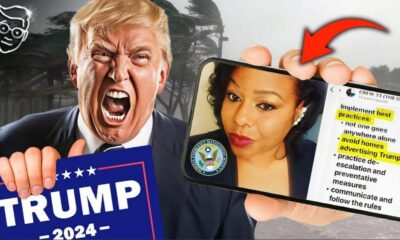
 Politics5 months ago
Politics5 months agoFEMA Staff Accused of Withholding Aid from Trump Supporters After Hurricane – Calls for Hate Crime Charges and Jail Time Emerge
-
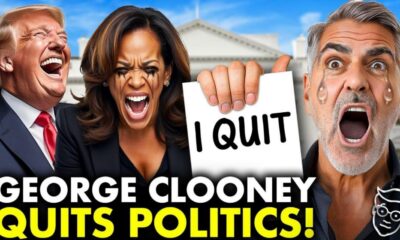
 Entertainment5 months ago
Entertainment5 months agoGeorge Clooney’s Final Stand: Hollywood Icon QUITS Politics for Good After Kamala Harris’ Slip and Trump Triumph
-

 Politics1 year ago
Politics1 year agoTucker and President Trump explore Bedminster and talk about “America’s favorite sport” and what happens if you misbehave at Bedminster
-
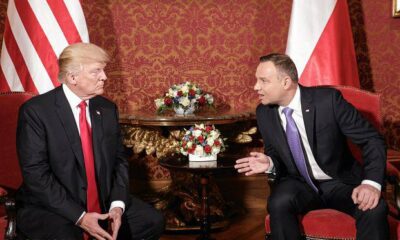
 Politics5 months ago
Politics5 months agoPolish President Andrzej Duda Reportedly Visits Mar-a-Lago to Meet with Donald Trump
-
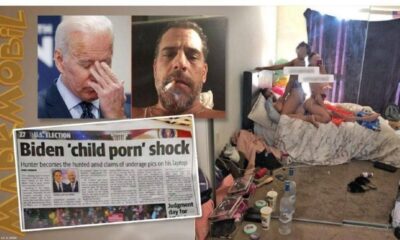
 Politics1 year ago
Politics1 year agoEXPOSED: JOE BIDEN TRAGEDY ADULT VIDEO PUBLISHED BY TUCKER!
-

 Politics5 months ago
Politics5 months agoTrump’s Bold Move: Dan Bongino for Secret Service Director? The Inside Scoop on Security and Threats!
-

 Politics5 months ago
Politics5 months agoFormer Disney and Pixar Designer Sentenced to 25 Years for Child Exploitation and Human Trafficking
-

 Politics5 months ago
Politics5 months agoTrump’s Bold Move: Appoints Hardline Border Czar to Launch Mass Deportations – “Kamala, You’re FIRED!
-
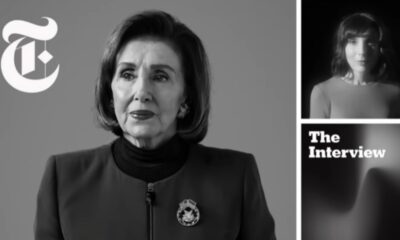
 Politics5 months ago
Politics5 months agoMSNBC in Flames! Pelosi Blames Biden for Kamala Endorsement—A Turning Point for the Democratic Party?







